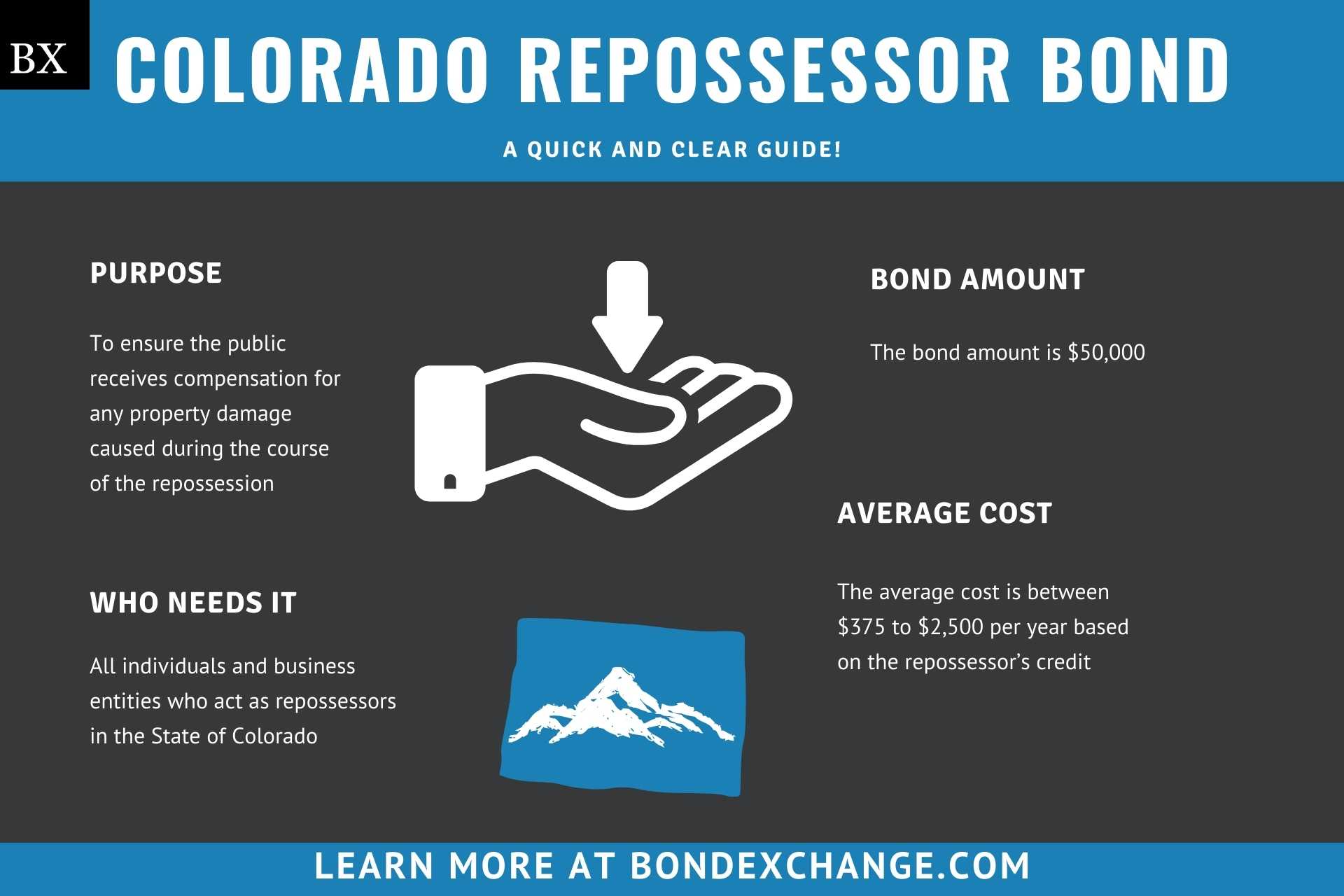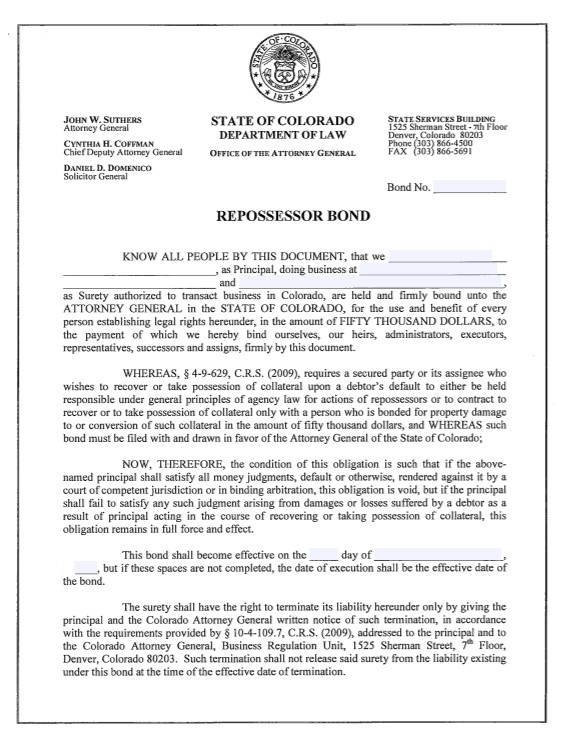Colorado Repossessor Bond: A Comprehensive Guide
March 24, 2021

This guide provides information for insurance agents to help repossessors obtain Colorado Repossessor Bonds
At a Glance:
- Average Cost: Between $375 to $2,500 per year based on the repossessor’s credit
- Bond Amount: $50,000
- Who Needs It: All individuals and business entities who act as repossessors in the State of Colorado
- Purpose: To ensure the public receives compensation for any property damage caused during the course of the repossession
- Who Regulates Repossessors in Colorado: The Colorado Department of Law
Background
Colorado Statute 4-9-629 requires all repossessors operating in the state to file a surety bond with the Colorado Department of Law. The Colorado legislature enacted the bonding requirement to ensure that repossessors engage in ethical business practices. Repossessors must purchase and maintain a $50,000 repossessor surety bond prior to conducting business operations.
What is the Purpose of the Colorado Repossessor Bond?
Colorado requires repossessors to purchase a $50,000 surety bond prior to performing any repossessions. The bond ensures that the public will receive compensation for any property damage caused during the course of a repossession. In short, the bond is a type of insurance that protects the public if the repossessor damages the property they have hired to repossess.

How Can an Insurance Agent Obtain a Colorado Repossessor Surety Bond?
BondExchange makes obtaining a Colorado Repossessor Bond easy. Simply login to your account and use our keyword search to find the “repossessor” bond in our database. Don’t have a login? Enroll now and let us help you satisfy your customers’ needs. Our friendly underwriting staff is available by phone (800) 438-1162, email or chat from 7:30 AM to 7:00 PM EST to assist you.
At BondExchange, our 40 years of experience, leading technology, and access to markets ensures that we have the knowledge and resources to provide your clients with fast and friendly service whether obtaining quotes or issuing bonds.
Is a Credit Check Required for the Colorado Repossessor Bond?
Surety companies will run a credit check on the owners of the repossession company to determine eligibility and pricing for the Colorado Repossession bond. Owners with excellent credit and work experience can expect to receive the best rates. Owners with poor credit may be declined by some surety companies or pay higher rates. The credit check is a “soft hit”, meaning that the credit check will not affect the owner’s credit.
How Much Does the Colorado Repossessor Bond Cost?
The Colorado Repossessor surety bond can cost anywhere between $375 to $2,500 per year. Insurance companies determine the rate based on a number of factors including your customer’s credit score and experience. The chart below offers a quick reference for the approximate bond cost on a $50,000 bond requirement.
$50,000 Repossessor Bond Cost
| Credit Score | Bond Cost (1 year) |
|---|---|
| 800+ | $375 |
| 625 – 799 | $500 |
| 600 – 624 | $1,250 |
| 575 – 599 | $1,500 |
| 500 – 575 | $2,500 |
*The credit score ranges do not include other factors that may result in a change to the annual premium offered to your customers, including but not limited to, years of experience and underlying credit factors contained within the business owner’s credit report.
How Does Colorado Define “Repossessor?”
To paraphrase Colorado Statute 42-6-146, a repossessor is any individual or business who physically takes possession of any motor vehicle and transports it to a creditor.
How do Repossessors Apply for a Surety Bond in Colorado?
Repossessors must submit a surety bond application with the Colorado Attorney General. This application does not guarantee that a surety company will issue your customer your bond, but instead will determine whether the Colorado Department of Law deems your customer eligible to act as a repossessor.
Repossessors should mail the completed application, including a $150 application fee and a Certificate of Good Standing, to the following address:
Colorado Attorney General
Consumer Protection Unit
1300 Broadway, 7th Floor
Denver, CO 80203
What Are the Insurance Requirements for Colorado Repossessors?
The State of Colorado does not require repossessors to obtain any form of liability insurance. Repossessors must purchase and maintain a $50,000 surety bond.
How Do Colorado Repossessors File Their Bond?
Repossessors should mail the completed bond form, including the power of attorney, to the following address:
Colorado Attorney General
Consumer Protection Unit
1300 Broadway, 7th Floor
Denver, CO 80203
The repossessor surety bond requires signatures from both the surety company that issues the bond and the repossessor. The surety company should include the following information on the bond form:
- Legal name and address of entity/individual(s) buying the bond
- Surety company’s name
- Date the bond is signed
- Date the bond goes into effect
What Can Repossessors Do to Avoid Claims Against the Colorado Repossessor Bond?
To avoid claims on the Repossessor Bond, repossessors must ensure not to damage any property when repossessing a motor vehicle.
What Other Insurance Products Can Agents Offer Repossessors in Colorado?
Colorado does not require repossessors to obtain any form of liability insurance. However, most reputable businesses will seek to obtain this insurance anyway. Bonds are our only business at BondExchange, so we do not issue liability insurance, but our agents often utilize brokers for this specific line of business. A list of brokers in this space can be found here.
How Can Insurance Agents Prospect for Colorado Repossessor Customers?
Colorado conveniently provides a public database to search for active repossessors in the state. The database can be accessed here. Contact BondExchange for additional marketing resources. Agents can also leverage our print-mail relationships for discounted mailing service

